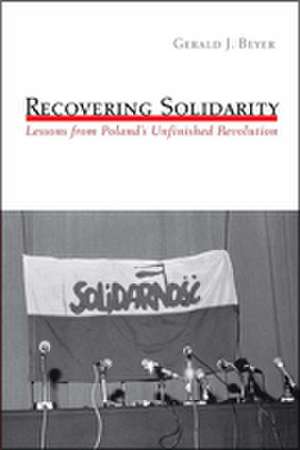Recovering Solidarity – Lessons from Poland`s Unfinished Revolution: Catholic Social Tradition
Autor Gerald Beyeren Limba Engleză Paperback – 14 ian 2010
In Recovering Solidarity, Gerald J. Beyer provides a contextualized theological and ethical treatment of the idea of solidarity. He focuses particularly on the Polish Solidarity movement of the 1980s and the ways in which that movement originally embodied but, during the country's transformation to a capitalist democratic society, soon abandoned this important aspect of the Catholic social tradition. Using Poland as a case study, Beyer explores the obstacles to promoting an ethic of solidarity in contemporary capitalist societies and attempts to demonstrate how the moral revolution of the early Solidarity movement can be revived, both in its country of origin and around the world. Recovering Solidarity is widely interdisciplinary, utilizing Catholic social tradition, philosophical ethics, developmental economics, poverty research, gender studies, and sociology. It will appeal to those interested in the problems of poverty and justice.
"Recovering Solidarity raises an eloquent, much needed challenge for all nations today, both developed and developing. Beyer paints a poignant picture of how the inspiring movement that brought freedom to Poland died at the hands of supporters of unlimited market freedom. Solidarity and participation remain essential ethical supports for true freedom, and will be indispensable to addressing the new poverty in Poland today. Required reading for all concerned with the role of the market throughout the post-1989 world." --David Hollenbach, S.J., Boston College
"Recovering Solidarityuses a multidisciplinary approach to probe Poland's resistance movement for a deeper understanding of the potential of solidarity in modern society. This book shines a light on the contradictions of the phenomenon--both in our understanding of what it means to act 'in solidarity' and in the development of Poland's social movement. Beyer's sophisticated and subtle treatment of the dimensions of poverty in contemporary Poland helps the reader understand its broader implications." -- Maryjane Osa, Northwestern University
"This volume is enormously valuable in the classroom. No other book grounds a theological and ethical discussion of solidarity in the lived history of the Polish Solidarity movement, a history that includes the collision of the ideals of solidarity with the neoliberal economic programs enacted by the Solidarnosc government when it came to power. The book leaves students facing Poland's stark problem, and our own: how to act upon solidarity in an economy that systematically obscures our mutual interdependence and the common good." --Vincent J. Miller, University of Dayton
"Recovering Solidarity raises an eloquent, much needed challenge for all nations today, both developed and developing. Beyer paints a poignant picture of how the inspiring movement that brought freedom to Poland died at the hands of supporters of unlimited market freedom. Solidarity and participation remain essential ethical supports for true freedom, and will be indispensable to addressing the new poverty in Poland today. Required reading for all concerned with the role of the market throughout the post-1989 world." --David Hollenbach, S.J., Boston College
"Recovering Solidarityuses a multidisciplinary approach to probe Poland's resistance movement for a deeper understanding of the potential of solidarity in modern society. This book shines a light on the contradictions of the phenomenon--both in our understanding of what it means to act 'in solidarity' and in the development of Poland's social movement. Beyer's sophisticated and subtle treatment of the dimensions of poverty in contemporary Poland helps the reader understand its broader implications." -- Maryjane Osa, Northwestern University
"This volume is enormously valuable in the classroom. No other book grounds a theological and ethical discussion of solidarity in the lived history of the Polish Solidarity movement, a history that includes the collision of the ideals of solidarity with the neoliberal economic programs enacted by the Solidarnosc government when it came to power. The book leaves students facing Poland's stark problem, and our own: how to act upon solidarity in an economy that systematically obscures our mutual interdependence and the common good." --Vincent J. Miller, University of Dayton
Preț: 292.05 lei
Nou
Puncte Express: 438
Preț estimativ în valută:
55.88€ • 58.49$ • 46.51£
55.88€ • 58.49$ • 46.51£
Carte tipărită la comandă
Livrare economică 31 martie-14 aprilie
Preluare comenzi: 021 569.72.76
Specificații
ISBN-13: 9780268022167
ISBN-10: 026802216X
Pagini: 336
Dimensiuni: 154 x 232 x 29 mm
Greutate: 0.5 kg
Ediția:1st Edition
Editura: MR – University of Notre Dame Press
Seria Catholic Social Tradition
ISBN-10: 026802216X
Pagini: 336
Dimensiuni: 154 x 232 x 29 mm
Greutate: 0.5 kg
Ediția:1st Edition
Editura: MR – University of Notre Dame Press
Seria Catholic Social Tradition
Recenzii
"Recovering Solidarity raises an eloquent, much needed challenge for all nations today, both developed and developing. Beyer paints a poignant picture of how the inspiring movement that brought freedom to Poland died at the hands of supporters of unlimited market freedom. Solidarity and participation remain essential ethical supports for true freedom, and will be indispensable to addressing the new poverty in Poland today. Required reading for all concerned with the role of the market throughout the post-1989 world." — David Hollenbach, S.J., Boston College
"Recovering Solidarity uses a multidisciplinary approach to probe Poland's resistance movement for a deeper understanding of the potential of solidarity in modern society. This book shines a light on the contradictions of the phenomenon—both in our understanding of what it means to act 'in solidarity' and in the development of Poland's social movement. Beyer's sophisticated and subtle treatment of the dimensions of poverty in contemporary Poland helps the reader understand its broader implications." —Maryjane Osa, Northwestern University
"This volume is enormously valuable in the classroom. No other book grounds a theological and ethical discussion of solidarity in the lived history of the Polish Solidarity movement, a history that includes the collision of the ideals of solidarity with the neoliberal economic programs enacted by the Solidarnosc government when it came to power. The book leaves students facing Poland's stark problem, and our own: how to act upon solidarity in an economy that systematically obscures our mutual interdependence and the common good." —Vincent J. Miller, University of Dayton
"This book serves as an extraordinarily illuminating case study of the application of Catholic social teachings to contemporary economic questions. It is richly documented and leaves no stone unturned in its pursuit of answers to its central questions about the nature of solidarity and how this concept has been used, misused, and only partially realized in post-Soviet Poland." — Thomas Massaro, S.J., Boston College School of Theology and Ministry
“. . . it is a remarkable contribution to the studies of Polish (and more generally East European) economic transformation and its disturbing by-products: mass unemployment, growing social inequalities, and deepening poverty. It is also a brilliant introduction to applied Catholic social thought.” —H-net: Humanities and Social Sciences, Reviews Online
“To my knowledge, Gerald J. Beyer is the first scholar to investigate seriously the concept of ‘solidarity’ itself. In a book that is both rigorous and passionate, he offers a fresh analysis of Poland’s path since 1989. He focuses on the persistence, and growth, of poverty in postrevolutionary Poland, and on the decline of interest in those who have been marginalized. . . . Beyer takes a cherished concept seriously, challenging Poles to embrace solidarity as an ethic and not just as a memory.” —Slavic Review
"Drawing on Catholic social teaching as well as on economist Amartya Sen, Beyer challenges the church to resist the neoliberalism that currently dominates Polish political decision-making. The book is uniquely valuable in drawing on Polish language literature as well as interactions with key Polish leaders." —Religious Studies Review
“It is good to give short term aid to a needy person or attend a fundraiser. But solidarity is different. It has an institutional dimension, writes Beyer. It requires a strong effort to get everyone, especially the poor, participating in society.” —Initiatives In Support of Christians in the World
Notă biografică
Gerald J. Beyer is assistant professor of theology at Saint Joseph's University in Philadelphia, Pennsylvania.










